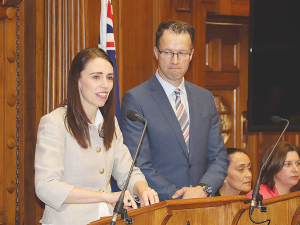DairyNZ Levy Vote Underway as Chair Highlights Seven-Fold Return
Voting has started for the renewal of DairyNZ's milksolids levy.
 Prime Minister Jacinda Ardern and DairyNZ chief executive Tim Mackle at last week’s announcement in Wellington.
Prime Minister Jacinda Ardern and DairyNZ chief executive Tim Mackle at last week’s announcement in Wellington.
The emissions train is leaving the station and farmers need to be aboard, says DairyNZ chief executive Tim Mackle.
He was responding to last week’s news that the farming sector and the Government have signed a plan to reduce primary sector emissions.
The plan will see the parties together developing practical, cost-effective ways to measure and price emissions at farm level by 2025.
To advance this the Government has introduced the Climate Change Response (Emissions Trading Reform) Amendment Bill due for a first reading next month and then referral to a select committee.
The aim is to reduce farm emissions by 2025, but there is a proviso in the Bill which stipulates that if the independent Climate Change Commission doesn’t think sufficient progress is being made at farm level the Government will intervene.
A five year action plan will include providing better tools for estimating and benchmarking emissions on farms; integrated farm plans that include a climate module; investment in research, development and commercialisation; increased farm advisory capacity; and capability and incentives for early adopters.
The plan is based on a document He Waka Eke Noa – Our Future in Our Hands developed by the primary sector and it negates a proposal on this subject in July of this year.
Prime Minister Jacinda Ardern says the agreement is a world first which moves New Zealand closer to its goal to become the world’s most sustainable food producer.
“We need a plan that supports our environment but also one that support our primary sector. A plan that is practical, innovative and achievable.”
Ardern says it’s great to see primary sector leaders sharing the same aspirations as the Government.
Mackle says the sector is grateful that the Government has listened to the industry and devised a pragmatic solution. In this win win situation the Government wants to get moving forward at the same time as we want the right approach -- a time to work through the issues, he says.
“There are still a lot of details that we have to work through. This gives us time and I think farmers will appreciate that. It’s also certainty for farmers and it gives time to work through these things carefully.
“We must be able to measure things at a farm level and put farm plans in place so that farmers have clarity on what they need to do to manage emissions.”
Mackle says they must continue with R&D of mitigation options.
But he says DairyNZ is not entirely happy with the Government intervention arrangement and doesn’t think it is necessary.
Voting has started for the renewal of DairyNZ's milksolids levy.
The most successful catchment groups in NZ are those that have 'a source to sea' approach.
Associate Agriculture Minister and Manawatu dairy farmer Andrew Hoggard says the free trade agreement (FTA) negotiated with India is not a bad deal and his party, Act, will support it when it goes before Parliament.
Newly released data from Environment Canterbury (ECan) Farm Environment Plan (FEP) audits are showing a dramatic lift in environmental performance across the region.
A solid recovery of global dairy prices this year makes a $9.50/kgMS milk price almost a shoo-in for this season.
As New Zealand marks the United Nations’ International Year of the Woman Farmer 2026 (IYWF 2026), industry leaders are challenging the misconception that women only support farming.
OPINION: Fonterra may be on the verge of selling its consumer business in New Zealand, but the co-operative is not…
OPINION: What does the birth rate in China have to do with stock trading? Just ask a2 Milk Company.